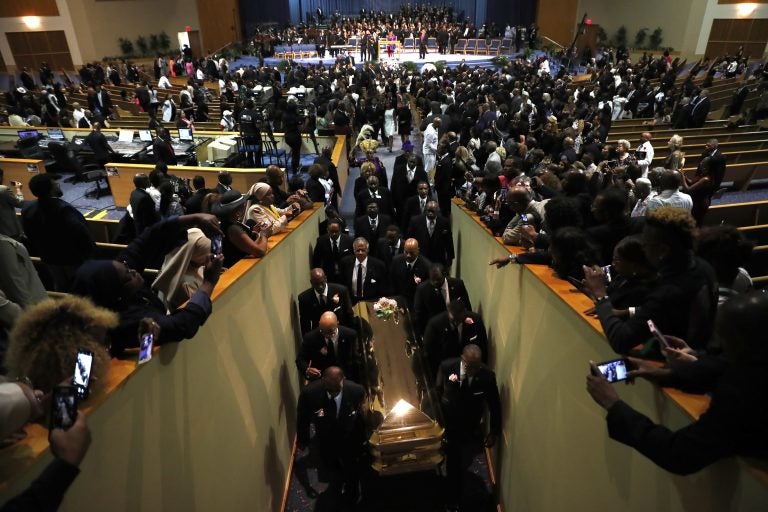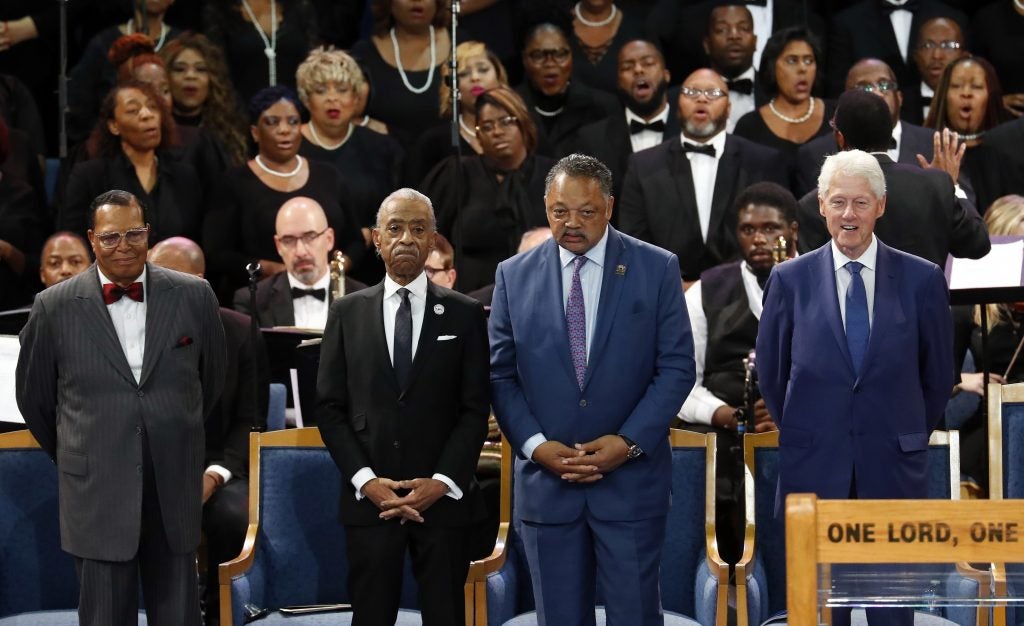Calls for respect for black America at Franklin funeral
Amid the gospel, personal reflections and grief were calls to register and turnout to vote.

Pallbearers carry the casket out of Greater Grace Temple at the end of the funeral for Aretha Franklin, Friday, Aug. 31, 2018, in Detroit. Franklin died Aug. 16, 2018 of pancreatic cancer at the age of 76. (Jeff Roberson/AP Photo)
As Aretha Franklin was remembered at her funeral Friday as a proud black woman who also used her magnificent voice to stand up for the black community she loved, several speakers used the moment to continue to demand respect for black America.
Amid the gospel, personal reflections and grief were calls to register and turnout to vote in November and condemnation of President Donald Trump, who, upon her death, referred to Franklin as “someone who worked for me” — a comment that rankled many African-Americans.
“No — she used to perform for you,” the Rev. Al Sharpton said to cheers and applause from the crowd. “She worked for us. Aretha never took orders from nobody but God.”

Franklin’s civil rights legacy was mentioned often during the eight-hour service, and was tied to her faith and roots in the black church. Many also mentioned her father, the Rev. C.L. Franklin, and his civil rights leadership, which influenced his daughter from a young age.
Late Friday, Franklin was laid to rest in a mausoleum at Woodlawn Cemetery, the final resting place of her father.
None of the politicians present — including former President Bill Clinton and former Attorney General Eric Holder — took the opportunity to turn the event partisan. Michigan Democratic House Rep. Brenda Lawrence took a moment to recognize Arizona Republican Sen. John McCain, whose funeral is Saturday.
But others seized on Trump’s comments and Franklin’s message of dignity to speak to the present social and political climate. In pointing out the long lines to pay tribute to Franklin this week, the Rev. Jesse Jackson lamented that the lines to vote often aren’t nearly as long.
“Aretha was on the battleground for 60 years,” Jackson told the audience. “We have long lines to celebrate death, and short lines for voting. Something is missing. If you leave here today and don’t register to vote, you’re dishonoring Aretha.”
Judge Greg Mathis, one of Franklin’s many friends who often talked politics with her, said that his last conversation with Franklin earlier this summer was about the ongoing water crisis in Flint, Michigan, where government negligence has left residents living with lead-tainted water since 2014.
“Her last words to me … were ‘Go back up there and sock it to ’em!,'” Mathis told the crowd before vowing that he would in her memory.
Some made a statement without saying a word. When she was shouted out from the stage, California Democrat Rep. Maxine Waters — who has called frequently for Trump’s impeachment and is a campaign rally punching bag for the president — acknowledged the crowd with the “Wakanda salute,” from the movie “Black Panther,” closing her fists and crossing her arms over her chest to applause.
Many in the audience, including President Clinton, stood and cheered.
“Everybody just point over there and tell her, ‘We got your back!'” said Bishop Charles H. Ellis III, pastor of Greater Grace Temple, which the audience shouted in Waters’ direction.
Georgetown University sociologist Michael Eric Dyson took several shots at Trump in his remarks, assigning the president several nicknames: “orange apparition,” ”lugubrious leech,” ”doppleganger of deceit and deceit,” ”lethal liar,” ”dimwitted dictator,” ”foolish facist.”
“She ain’t work for you,” Dyson shouted over applause. “She worked above you. She worked beyond you. Get your preposition right.”
Whack is The Associated Press’ national writer on race and ethnicity. Follow her work on Twitter at http://www.twitter.com/emarvelous.
WHYY is your source for fact-based, in-depth journalism and information. As a nonprofit organization, we rely on financial support from readers like you. Please give today.




